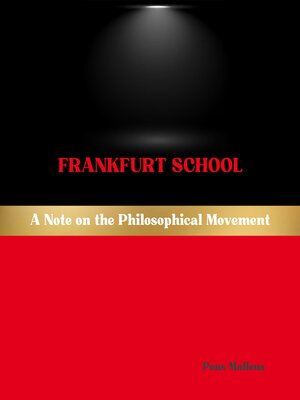Frankfurt School
audiobook (Unabridged) ∣ A Note on the Philosophical Movement · Western Philosophical Schools
By Pons Malleus

Sign up to save your library
With an OverDrive account, you can save your favorite libraries for at-a-glance information about availability. Find out more about OverDrive accounts.
Find this title in Libby, the library reading app by OverDrive.



Search for a digital library with this title
Title found at these libraries:
| Library Name | Distance |
|---|---|
| Loading... |
This audiobook is narrated by a digital voice.
The Frankfurt School stands as one of the most influential and challenging intellectual movements of the 20th century. Rooted in the Marxist tradition yet profoundly critical of its dogmatic forms, the thinkers associated with this school sought to understand—and ultimately transform—the structures of modern society. Their work remains as urgent today as it was in the aftermath of world wars, economic crises, and the rise of fascism that first shaped their critical lens.
This book is an attempt to introduce the core ideas, historical context, and enduring significance of the Frankfurt School. Rather than offering a rigid system of thought, the Frankfurt School developed a dynamic and often self-critical approach known as Critical Theory. This was not theory for its own sake, but theory aimed at human emancipation—an unrelenting critique of social conditions that limit freedom, rationality, and dignity. The thinkers at the heart of this tradition—Max Horkheimer, Theodor W. Adorno, Herbert Marcuse, Walter Benjamin, and later Jürgen Habermas—were united by a conviction that philosophy must engage with the real world and confront the contradictions of capitalist modernity.
Emerging from the Institute for Social Research, founded in Frankfurt in 1923, this school of thought responded to the failures of both capitalist democracies and Soviet-style communism. Their work spanned philosophy, sociology, psychology, economics, and aesthetics, reflecting a deep belief in interdisciplinary inquiry. Drawing on thinkers such as Hegel, Marx, Nietzsche, and Freud, the Frankfurt theorists examined the ways in which culture, media, and ideology play a role in reproducing social domination—even in societies that appear democratic and free.
If there is one lesson to take from their work, it is this: that critique is not cynicism, and that true freedom begins with the courage to question what we have come to accept as normal.







